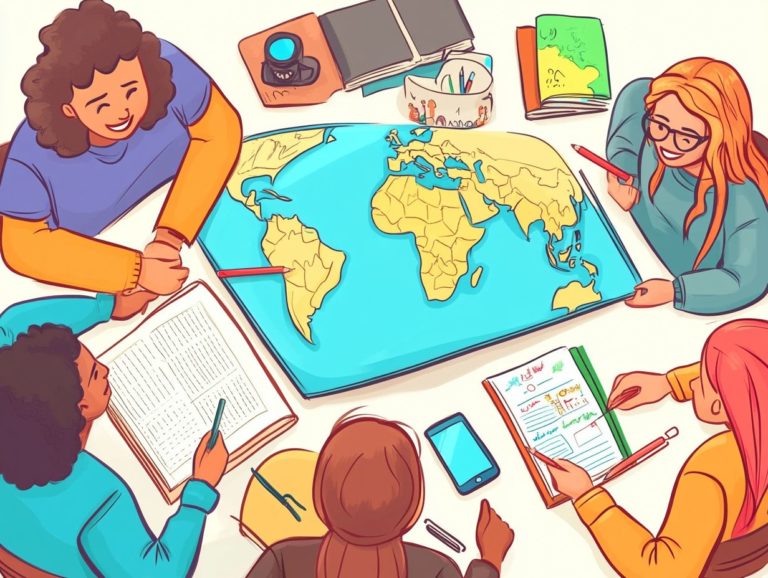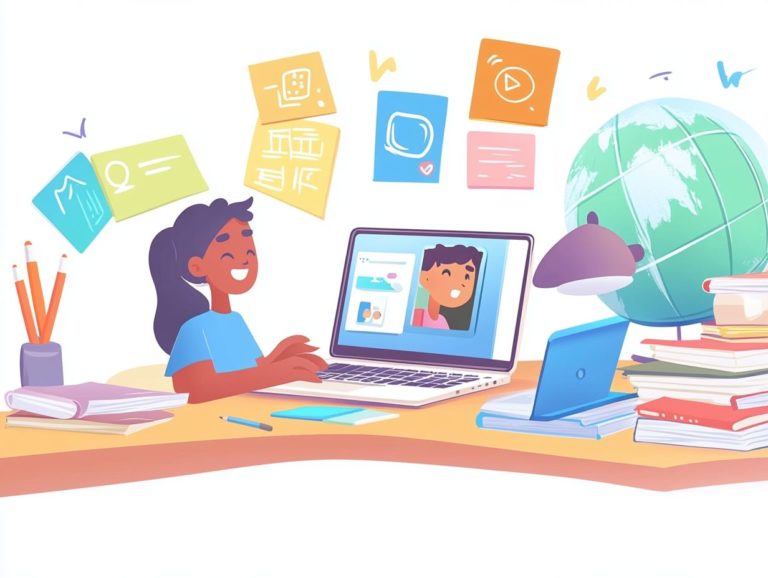How to Incorporate Language Learning into Daily Life
Learning a new language stands as one of life s most enriching pursuits, offering a gateway to diverse cultures, meaningful friendships, and countless opportunities.
This article delves into the mental and social advantages of becoming multilingual while also presenting practical strategies to weave language learning seamlessly into your daily routine.
Whether you choose to harness technology to sharpen your skills or immerse yourself in the culture, discover valuable insights on navigating common challenges and maintaining your motivation.
Embark on this journey and unlock a world of possibilities through language.
Contents
- Key Takeaways:
- Benefits of Learning a New Language
- Ways to Incorporate Language Learning into Daily Life
- Using Technology for Language Learning
- Creating a Language Learning Routine
- Immersion Techniques for Language Learning
- Overcoming Common Challenges in Language Learning
- Frequently Asked Questions
- 1. How can I incorporate language learning into my daily routine?
- 2. Is it possible to learn a language without taking a formal class?
- 3. How can I make language learning a fun and enjoyable part of my day?
- 4. How can I practice speaking a language if I don’t have anyone to practice with?
- 5. Are there daily activities or habits that can help improve my language skills?
- 6. Can I incorporate language learning into my social life?
Key Takeaways:

- Experience mental and social benefits by learning a new language, such as improved memory and communication skills.
- Incorporate language learning into daily life by using practical strategies and technology, setting goals, and immersing yourself in the culture.
- Overcome challenges by addressing frustration and using immersion techniques to fully engage with the language and culture.
Benefits of Learning a New Language
Learning a new language presents a wealth of advantages that go well beyond simple communication. It sharpens your thinking skills, nurtures social connections, and opens the door to a rich tapestry of cultures.
Research by Dr. Carol Dweck highlights the critical role of having a positive attitude towards learning in language acquisition. Embrace challenges and celebrate those small victories on your path to fluency.
Mastering a foreign language greatly enhances your confidence and adaptability in diverse social situations, making it a critical skill in our increasingly interconnected world.
Mental and Social Advantages
The mental and social advantages of learning a foreign language are truly remarkable. It stimulates your cognitive development and enhances your interpersonal communication skills.
As you engage with a new language, you may notice an impressive boost in your memory retention and an enhanced ability to tackle complex problems. These cognitive benefits arise from your brain adapting to comprehend and process various grammatical structures and vocabulary.
The social benefits are just as noteworthy. Learning a foreign language opens pathways to connect with diverse cultures and communities, fostering mutual respect and empathy. This cultural exchange enriches your experiences and deepens your appreciation for global perspectives, ultimately leading to more meaningful interactions in both your personal and professional life.
Ways to Incorporate Language Learning into Daily Life
Incorporating language learning into your daily life can be remarkably seamless, even within a busy schedule. By employing effective tools and strategies tailored to your routine, you can learn how to incorporate local language into daily life and make significant strides in your proficiency.
Whether it’s utilizing language apps or tuning into podcasts during your commute, the opportunities for independent learners are boundless, allowing you to enhance your communication skills with ease and enjoyment.
Practical Strategies and Tips
Implementing practical strategies and tips is vital for effective language learning, especially as you work toward goals that enable measurable progress over time. To enhance your experience, consider exploring how to make the most of language learning events.
By establishing Specific, Measurable, Achievable, Relevant, and Time-bound objectives, you create a clear roadmap for your advancement. Utilizing language apps maximizes your study time and transforms the process into an enjoyable experience, complete with gamified elements and interactive lessons.
Consistent practice is key. Daily exercises like listening to podcasts, reading articles, or engaging in conversations can significantly boost your retention and fluency. Tailoring these activities to your personal interests adds an engaging touch to your journey, ultimately leading to a more productive and rewarding learning experience.
Using Technology for Language Learning

Using technology for language learning has transformed how you engage with foreign languages. You now have access to many online resources and apps designed to boost your learning experience.
With personalized study plans and interactive tools like Tandem or italki, technology gives you the power to adopt a modern approach to mastering languages.
Online Resources and Apps
Platforms like italki and Tandem connect you with native speakers for real conversations. These interactions greatly enhance your learning experience.
These platforms not only facilitate engaging discussions but also provide tools for scheduling lessons and tracking your progress. Apps like Duolingo and Babbel offer structured lessons with fun challenges to keep you motivated.
Resources like Memrise use spaced repetition techniques to help you remember vocabulary effectively. With interactive flashcards and engaging video content, these tools make learning enjoyable while fostering a sense of community.
Creating a Language Learning Routine
Establishing a structured language learning routine is essential for achieving fluency. It helps you dedicate study time and set SMART goals Specific, Measurable, Achievable, Relevant, and Time-bound.
By committing to consistent practice, you can gradually overcome the frustrating intermediate plateau many learners face.
Setting Goals and Staying Motivated
Clear SMART goals create a roadmap for your progress. This approach nurtures both intrinsic and extrinsic motivation.
When your goals are clear, you can easily track your accomplishments and adjust your strategies. Regularly revisiting these goals keeps you motivated during challenging times.
Combining intrinsic motivators, like personal satisfaction, with extrinsic rewards, such as recognition, can deepen your commitment. Weaving these elements into your routine enriches your learning experience.
Immersion Techniques for Language Learning
Embracing immersion techniques helps you connect with authentic language and culture. This significantly enhances your proficiency and understanding.
Engaging in cultural activities, such as yoga classes or local recipes, brings the language to life. Exploring urban environments where the language is spoken adds richness to your learning journey.
Immersing Yourself in the Culture

Immerse yourself in the culture related to the language you re learning. This is one of the most effective ways to deepen your understanding of authentic language and social interactions.
Engaging in local events lets you savor traditions and connect with native speakers. Whether you re at festivals or community gatherings, these experiences enhance your language skills.
Urban spaces filled with art, music, and theater let you see the language in action. You’ll easily absorb nuances and everyday expressions.
Overcoming Common Challenges in Language Learning
Overcoming challenges like frustration and plateaus requires strategic approaches to ensure your growth. Recognizing hurdles helps you develop effective strategies for your language journey.
Dealing with Frustration and Plateaus
Frustration and intermediate plateaus are common in language learning, but don t worry! These moments can be managed with a growth mindset and consistent practice.
Techniques like setting realistic goals and trying different study methods can reignite your motivation. Remember, these challenges are opportunities for growth.
Activities like conversation practice and multimedia resources can make your learning journey engaging. A positive attitude towards setbacks builds resilience, helping you adapt and thrive.
Frequently Asked Questions
1. How can I incorporate language learning into my daily routine?
Set aside a specific time each day to practice. This could be during your commute or lunch break. You can also use the language in everyday activities, like listening to music or watching TV shows in it, and refer to tips for daily practice to enhance your learning experience.
2. Is it possible to learn a language without taking a formal class?

Absolutely! Many resources for self-study are available, like apps and online courses. These let you learn without the commitment of a formal class.
3. How can I make language learning a fun and enjoyable part of my day?
Find a study method that suits you, like flashcards or conversation practice. Look for interesting content in the target language to stay motivated.
4. How can I practice speaking a language if I don’t have anyone to practice with?
Practice speaking alone by recording yourself or using language exchange platforms. You can also talk to yourself in the target language to improve your skills.
5. Are there daily activities or habits that can help improve my language skills?
Yes, many activities can enhance your language skills. Change your phone or computer language to your target language.
Label items in your home with their corresponding names in that language. Write your to-do lists and journal entries in the target language.
These small habits keep you engaged and help improve your skills.
Absolutely! Learning a language helps you connect with others and make new friends.
Join a language exchange group today and start making new friends! You can also join conversation clubs in your community or connect with online language learning communities.
This allows you to practice your skills while meeting new people who share your interest in learning languages.





